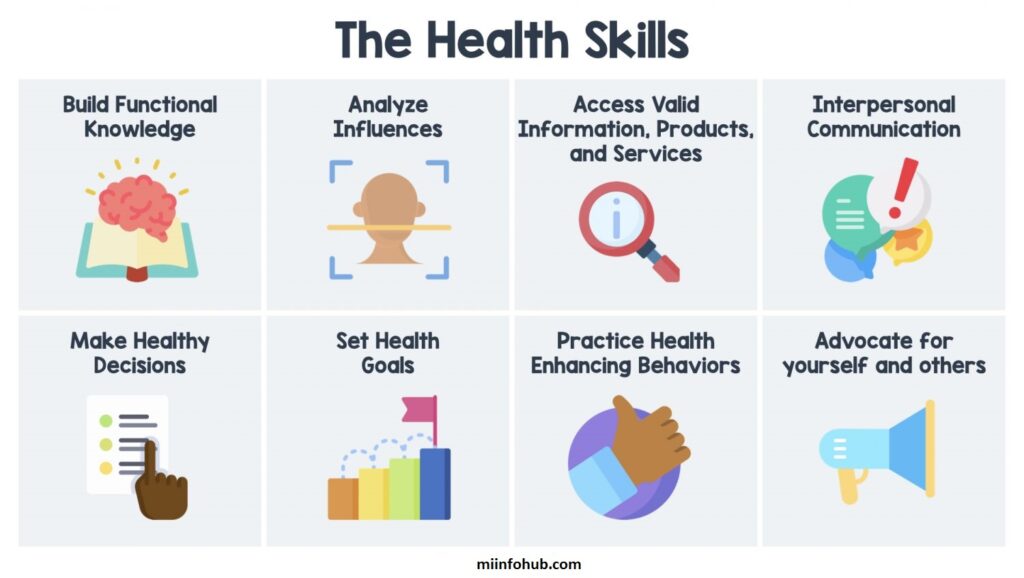Becoming a health teacher is an incredibly rewarding career, allowing you to positively influence the well-being of students by teaching them essential life skills focused on physical, mental, and emotional health. This guide will walk you through the steps needed to embark on this career path and grow into a successful health educator.

Earn A Relevant Degree
Your first step is to obtain a bachelor’s degree in health education, physical education, or a related field, which typically takes about 4 years to complete. These programs provide you with the foundational knowledge and skills needed to effectively teach health and wellness to students. Most degree programs include a variety of courses that cover essential subjects such as:
- Nutrition: Learn the principles of healthy eating, dietary guidelines, and how nutrition affects overall health.
- Physical fitness: Study exercise science, physical activity benefits, and fitness program design.
- Mental health awareness: Understand the basics of mental health, including emotional well-being, stress management, and mental illness.
- Substance abuse prevention: Gain knowledge about the risks of substance abuse and strategies to educate students about prevention and healthy choices.
To enhance your job prospects, choose a program that includes teacher certification courses. These courses prepare you to meet state licensing requirements and often involve student teaching experience, making it easier to transition into the workforce. Some schools offer combined degree and certification programs, which can save time by allowing you to earn both your degree and certification simultaneously, streamlining the licensure process. If you are intrusted about health and wellness business then click here.
Complete A Teacher Preparation Program
Most states require aspiring health teachers to complete a teacher preparation program. This program typically includes two key components:
- Educational coursework: You’ll engage in in-class learning on essential topics like teaching methods, classroom management, and educational psychology. These courses equip you with the tools to effectively manage a classroom and deliver lessons in a way that engages and supports students.
- Student teaching experience: This is a hands-on opportunity to teach in a real classroom under the supervision of a licensed teacher. You’ll gain practical experience by planning lessons, teaching students, and receiving feedback, helping you develop confidence and refine your teaching approach.
Many universities offer these preparation programs as part of their bachelor’s degree programs, allowing you to complete everything in one streamlined process. However, they can also be pursued separately after graduation if your degree program didn’t include a certification track, offering flexibility for those who may be switching careers or pursuing education later on.
Obtain State Certification
Each state has specific requirements for becoming a health teacher, but most commonly, you’ll need to:
- Pass a certification exam: This is often the Praxis exam, which assesses your knowledge and teaching skills.
- Complete a background check: A clean record is typically required for licensure.
- Apply for state licensure: You’ll need to submit proof of your degree and teacher preparation program completion to obtain your license.
To stay informed, regularly check your state’s education department website for any updates or changes to the requirements.

Gain Practical Experience
While certification is essential, practical teaching experience can set you apart from other candidates. To strengthen your resume and develop your skills, consider pursuing:
- Internships or teaching assistant positions in schools, community health centers, or wellness programs. These roles provide direct exposure to health education environments.
- Volunteer opportunities in health education initiatives, such as local health awareness campaigns or after-school wellness programs. This not only enhances your portfolio but also demonstrates your commitment to community well-being.
- Substitute teaching roles to gain hands-on experience in managing a classroom, delivering lessons, and working with students of various ages and backgrounds.
These experiences will not only improve your teaching abilities but also provide valuable insights into effective health education practices and student engagement, making you a more competitive candidate.
Engage In Continuing Education
Health education is constantly changing as new research, teaching methods, and health trends emerge. To remain an effective health teacher, it’s essential to:
- Complete required continuing education hours: Many states require teachers to fulfill a certain number of professional development or continuing education credits to renew their teaching license. This ensures you remain competent in new teaching strategies and health topics.
- Enroll in continuing education courses on evolving topics like mental health, nutrition advancements, fitness techniques, and the use of digital tools in teaching. These courses help you stay informed on modern approaches to health education.
- Attend professional development workshops or webinars focused on current health issues, teaching strategies, and student engagement techniques. This keeps you up to date with the latest trends in health education.
- Stay current with health policies and guidelines issued by national health organizations or your state’s department of education. These can include updates on school health programs, new wellness initiatives, or safety regulations.
- Subscribe to health education journals or join professional organizations like the American School Health Association (ASHA). These offer insights into cutting-edge research and teaching practices.

Develop Communication And Leadership Skills
As a health teacher, effective communication is essential. You must be able to explain complex health concepts in a clear and relatable manner for students. Use simple language, examples, and visual aids to make topics accessible. Engaging students in discussions can help reinforce their understanding.
Strong leadership skills are equally important. Health teachers often lead sensitive discussions on topics such as substance abuse, mental health, and body image. Establishing a safe and supportive classroom environment encourages students to share their thoughts and concerns openly.
To enhance these soft skills, consider the following:
- Seek feedback: Regularly ask for feedback from colleagues or mentors on your teaching style and communication methods. Constructive criticism can guide your growth.
- Participate in communication workshops: These can help you learn techniques for effective speaking, active listening, and fostering classroom discussions.
- Join leadership training programs: Focused on building confidence and assertiveness, these programs prepare you to lead sensitive conversations.
- Practice role-playing scenarios: This method helps you navigate challenging discussions with students and build your ability to respond empathetically.
Join Professional Networks
Building a strong network of professionals in health education can significantly enhance your career. Networking provides support, resources, and opportunities for collaboration and growth. Here are two prominent organizations you might consider joining:
Society For Public Health Education (SOPHE)
- Overview: SOPHE focuses on advancing the profession of health education and promotion. It connects health educators across various settings, including schools, community organizations, and healthcare facilities.
- Benefits:
- Access to a wealth of resources, including publications and research materials.
- Opportunities for professional development through workshops, webinars, and conferences.
- Networking opportunities with peers and experts in health education.
- Advocacy initiatives to promote health education policies at local, state, and national levels.
American Association For Health Education (AAHE)
- Overview: AAHE is dedicated to supporting health educators in their mission to improve public health through education. It provides a platform for educators to share best practices and research.
- Benefits:
- Professional development resources, including certifications and training programs.
- A strong network of health educators, allowing for collaboration and mentorship.
- Opportunities to participate in national conferences and events, enhancing your professional visibility.
- Access to journals and publications that keep you informed about the latest trends and research in health education.

Additional Tips For Networking
- Join Local Health Initiatives: Get involved in community health programs or initiatives, which can help you build relationships with local health professionals.
- Attend Conferences: Participate in local, state, and national health education conferences to meet professionals in your field.
- Engage on Social Media: Follow relevant health education groups and professionals on platforms like LinkedIn and Twitter to stay connected and share insights.
Find Job Opportunities
Once you have your certification, explore different job options:
- Public or private schools: Most health teachers work in K-12 schools, educating students on health, fitness, and wellness.
- Community health organizations: Health educators can also work in community programs that focus on promoting public health initiatives.
- Online education platforms: Some educators find success teaching health courses or offering one-on-one coaching online.

Commit To Lifelong Learning
To maintain your effectiveness as a health teacher, you must stay informed about changes in health education and teaching methods. Continue growing by:
- Attending workshops and seminars.
- Earning advanced certifications or degrees.
- Collaborating with colleagues to share ideas and improve your teaching methods.
Conclusion
Becoming a health teacher involves education, certification, and a passion for promoting student wellness. With the right degree, certification, and experience, you’ll be equipped to inspire and guide students toward healthier lifestyles. Stay committed to personal and professional development, and you’ll not only find success but make a meaningful impact on the lives of your students. Start your journey today by exploring degree programs or researching certification requirements in your state.


